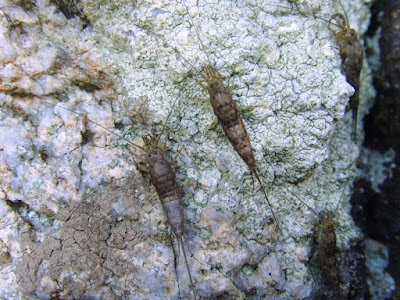Belongs within: Panhexapoda.
Contains: Meinertellidae.
The Archaeognatha, bristletails, are a group of wingless insects with an arched thorax modified for jumping.
Characters (from Ferguson 1990): Body form subcylindrical, thorax strongly arched; head hypognathous; eyes large, contiguous, with hundreds of ommatidia; vertex greatly reduced; frons large, with median ocellus; lateral ocelli large; mandibles primitive, consisting of a basal part with a single point of articulation to the cranium and a distal part with separate molar and incisor processes; palpus of maxillae with seven segments; labium with palpus of three unequal segments, the distal not greatly expanded apically; thoracic terga with very large paranotal lobes against sides; all leg segments essentially cylindrical; meso— and metathoracic coxae typically with styli (may be absent on mesothoracic coxa or both); femur and tibia large; tarsus with three tarsomeres; abdominal segments II—VII covered ventrally by three distinct sclerites; an anteromedial sternite and two lateral coxopodites; coxopodites of abdominal segments II—IX each with a posterolateral stylus; posterior edge of segments I—VII typically with one or two pairs of exsertile vesicles mesad of the styli.
<==Archaeognatha [Machilida, Machiloidea, Microcoryphia, Monocondylia]
| i. s.: Triassomachilis Sharov 1948 KS02 [Triassomachilidae GE05]
| `--T. uralensis Sharov 1948 K03
| Ditrigoniophthalmus oreophilus SBG11
|--Dasyleptidae [Cercopodata, Monura] R02
| |--Leoidodasypus sharoui RJ93
| `--Dasyleptus Brongniart 1885 FT05
| |--D. brongniarti Sharov 1957 K-P83
| `--D. sharovi GE05
`--+--Meinertellidae R02
`--Machilidae R02
|--Dilta littoralis GEW01, MG06
|--Petridiobus arcticus F90
|--Mesomachilis nearcticus F90
|--Mixomachilis remingtoni F90
|--Neomachilis halophilus F90
|--Trigoniophthalmus Verhoeff 1910 F90
| `--T. alternatus (Silvestri 1904) F90
|--Pedetontus Silvestri 1911 F90
| |--P. saltator Wygodzinsky & Schmidt 1980 F90
| `--P. unimaculatus R02
|--Machilis Latreille 1802 L02
| |--*M. polypoda [=Lepisma polypoda] L02
| |--M. strenuva F90
| `--M. variabilis LNM91
`--Petrobius Leach 1908 F90
|--P. brevistylis Carpenter 1913 [incl. P. canadensis Paclt 1969] F90
|--P. calcaratus Silvestri 1911 F90
|--P. californicus Silvestri 1911 F90
|--P. longicaudatus K-P83
|--P. maritimus Leach 1809 F90
|--P. persquamosus Silvestri 1911 F90
|--P. submutans Silvestri 1911 F90
`--P. superior Silvestri 1911 F90
*Type species of generic name indicated
REFERENCES
[FT05] Fayers, S. R., & N. H. Trewin. 2005. A hexapod from the Early Devonian Windyfield Chert, Rhynie, Scotland. Palaeontology 48 (5): 1117–1130.
[F90] Ferguson, L. M. 1990. Insecta: Microcoryphia and Thysanura. In: Dindal, D. L. (ed.) Soil Biology Guide pp. 935-949. John Wiley & Sones: New York.
[GEW01] Giribet, G., G. D. Edgecombe & W. C. Wheeler. 2001. Arthropod phylogeny based on eight molecular loci and morphology. Nature 413: 157-161.
[GE05] Grimaldi, D., & M. S. Engel. 2005. Evolution of the Insects. Cambridge University Press: New York.
[K03] Kluge, N. J. 2003. About evolution and homology of genital appendages of insects. Trudy Russkogo Entomologicheskogo Obshestva [Proceedings of the Russian Entomological Society] 74: 3–16.
[KS02] Kluge, N. Yu., & N. D. Sinitshenkova. 2002. Order Ephemerida Latreille, 1810. The true mayflies (=Ephemeroptera Hyatt et Arms, 1891 (s. l.); =Euephemeroptera Kluge, 2000. In: Rasnitsyn, A. P., & D. L. J. Quicke (eds) History of Insects pp. 89–97. Kluwer Academic Publishers: Dordrecht.
[K-P83] Kukalová-Peck, J. 1983. Origin of the insect wing and wing articulation from the arthropodan leg. Canadian Journal of Zoology 61: 1618–1669.
[L02] Latreille, P. A. 1802. Histoire Naturelle, générale et particulière des crustacés et des insectes vol. 3. Familles naturelles des genres. F. Dufart: Paris.
[LNM91] Lawrence, J. F., E. S. Nielsen & I. M. Mackerras. 1991. Skeletal anatomy and key to orders. In: CSIRO. The Insects of Australia: A textbook for students and research workers 2nd ed. vol. 1 pp. 3–32. Melbourne University Press: Carlton (Victoria).
[MG06] Mallatt, J., & G. Giribet. 2006. Further use of nearly complete 28S and 18S rRNA genes to classify Ecdysozoa: 37 more arthropods and a kinorhynch. Molecular Phylogenetics and Evolution 40: 772–794.
[R02] Rasnitsyn, A. P. 2002. Subclass Lepismatona Latreille, 1804. The wingless insects (=Thysanura Latreille 1796, s. l.) In: Rasnitsyn, A. P., & D. L. J. Quicke (eds) History of Insects pp. 69–74. Kluwer Academic Publishers: Dordrecht.
[RJ93] Ross, A. J., & E. A. Jarzembowski. 1993. Arthropoda (Hexapoda; Insecta). In: Benton, M. J. (ed.) The Fossil Record 2 pp. 363–426. Chapman & Hall: London.
[SBG11] Staniczek, A. H., G. Bechly & R. J. Godunko. 2011. Coxoplectoptera, a new fossil order of Palaeoptera (Arthropoda: Insecta), with comments on the phylogeny of the stem group of mayflies (Ephemeroptera). Insect Systematics and Evolution 42: 101–138.

No comments:
Post a Comment
Markup Key:
- <b>bold</b> = bold
- <i>italic</i> = italic
- <a href="http://www.fieldofscience.com/">FoS</a> = FoS